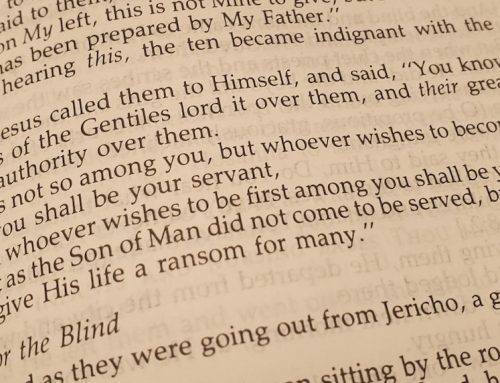One of the teachings of the Stanton Church of Christ that goes way back to the early days is that Christians should not send their kids to college. The reasons I’ve heard in defense of this teaching are more practical than scriptural. A verse like 2 Timothy 2:4 might be thrown around to suggest that going to college is “entangling” oneself with the affairs of the world, but this is a tenuous argument at best. Why is college “entangling,” but studying to learn a trade and advance through certifications is not?
The most common defense of the anti-college teaching I’ve heard is that colleges promote a lot of anti-Christian rhetoric, and there is a statistically large number of kids raised in Christian homes who depart from their parents beliefs when they get into college. With this basic fact I wholeheartedly agree. It’s Stanton’s conclusion–“Let’s make a rule about it”– that I disagree with.
Because of Stanton’s extreme legalism (rule-keeping), their first response to a question like this is to seek to find or make a rule, law, or judgment (whatever they want to call it) for all Christians to follow. This is not a scriptural approach. In fact, it’s completely unscriptural, because it necessarily requires one to teach doctrines which are the commandments of men.
While I can’t answer definitively the question of whether all Christians should or should not go to college, I believe there is wisdom the Bible offers that will direct us one way or the other. This wisdom cannot be applied universally in the same way to every family or every teen. Let me explain my own approach to this subject–both scripturally and practically. I have seven kids, most of whom are teens or early 20’s, so this is something my wife and I have given a great deal of thought, study and prayer to.
The college experience
First, I’ll stipulate right away that I don’t have romanticized ideas about wanting “The College Experience” for my kids. I see the typical “college experience” as nothing to be wished upon any teen unless he or she needs it.
In my opinion, college is a means to an end, not a required step everyone needs to take to “grow up” or “be responsible.” Some of the most financially successful business people either dropped out of college, or never went. College uses a cookie cutter approach which tend to create cookie cutter employees. Of course, there are exceptions, and I’m not going to try to even argue this point. You are free to believe what you wish about the quality of the education most colleges offer.
However, Stanton is not alone or even radical in it’s recognition that college and university campuses can be the graveyard of a teen’s faith if he or she is not grounded and convicted. Therein lies the problem, I believe. Most Christian parents (inside and outside of the Stanton sect) have entrusted the church with the spiritual training of their kids, and have failed to take responsibility for teaching the philosophical foundations for Christianity themselves.
Have you ever talked about atheism with your kids and openly discussed challenging questions? I mean hardball questions, not puff questions that are easily shot down? If you don’t provide sound, persuasive reasoning, you can bet they’ll be persuaded by the many secular and atheist activists on college campuses. When my teens are challenged by tough questions–like “How can a loving God allow evil to exist?”–I don’t want them to suddenly have a crisis of faith and throw God out the window. For that to happen, we have to educate ourselves on what the secularists are teaching and ground our kids deeply in real arguments that counter them.
What about the immoral cesspool that is the modern college campus? From frat parties to the prevalent hookup culture that exists, college is not some wonderful oasis of learning that I want or need all my kids universally to have to put up with. Even a firmly grounded Christian teen can face significant temptations on campus.
Homeschooling
Many of the reasons my wife and I are not big fans of the “college experience” are also reasons we’re not big fans of public schools, or group schools of any kind, for that matter. We are not judgmental about how anyone else has chosen to educate their kids, but we have chosen to home school, and have never regretted it. Of course, there are a million different approaches to home schooling, so please don’t judge me for that if you had a bad experience home schooling. We love it, and our college age kids, with minor exceptions, appreciate the benefits of how we approached it.
Our philosophy about college has grown out of our experience home schooling. Just as we bring in whatever educational tools and methods we need to reach each of our kids based on their unique personalities, we believe in a very individualized approach to college as well. Each child is different in how God made them, what they enjoy, and how they will use their education. It only makes sense that their education itself should be tailored to those unique needs.
Our individualized approach
I believe that our worldly education, whether that’s reading, writing, math, nursing, engineering, or a skill to pursue a trade or specialized job, is a means to an end. Since each person’s personality, talents, interests, and therefore desired “end” will be different, each person’s educational needs will thus be radically different as well. Most Christians have only thought about college for the purpose of a career or earning money, but what about the “kingdom purpose?” I know using something like a career for showing God’s love to the world is a foreign concept in the Stanton churches–how many members have you heard of who have learned a trade or pursued a degree to be able use it in the service of God or people?–but it’s a noble goal to think about. Paul used his tent-making to further the kingdom. Why can’t we use an engineering or nursing degree to do the same?
What this looks like for our kids is that during the last year of high school (remember, we home school), we encourage our kids to get a job, buy a car, start saving money more aggressively, and start going through what we call “life purpose planning.” We were introduced to this term by CollegePlus, a Christian-owned organization that coaches college students on getting the bulk of college credit through “credit by exam.” There is a Life Purpose Planning booklet that asks teens a lot of questions about their interests, and how they see the rest of their life unfolding. The information gleaned from those questions can serve as a guide when making future career or educational decisions.
I have a 20 year old daughter who will graduate with a B.A. of communication before she’s 21 following the “credit by exam” approach, without having spent single day on a university campus (except to take the exams, which she does at Boise State University’s testing center). I have a 21 year old son who will be graduating with a B.A. in business management following this approach.
I have an 18 year old daughter that is very compassionate and wants to become a nurse. She hopes to have the opportunity to serve kids in a third world country before she settles down to start a family. Because you can’t get a nursing degree using the “credit by exam” method, she is going to a community college for that.
We also recognize that some of our kids are not college bound at all, nor should they be. I have a son who hates the thought of college, but he is a very hard worker and extremely entrepreneurial. He is working hard while saving money to start his own business, and devouring books that will teach him the skills he needs to do so.
Some of our teens’ educational stories are not written yet, but I expect each story to be very different. The bottom line for each of them is that they are all baptized believers and are pursuing the gifts and talents God has blessed each of them with. For most of them, that doesn’t mean a traditional college campus, but when they feel God is calling them to a career that requires time on a college campus, that’s what they’ll do, and we’ll be fully supportive of that.
I am not unconcerned about the temptations and anti-Christian ideology promoted on-campus, but if God is leading the way in their lives, their time on a campus will be an opportunity to let their light shine, not a time to party and get away from mom and dad. The key is to teach our kids young to love God deeply, not because their mom and dad want them to believe the same things they do. I want my kids to be critical thinkers and to own their own faith.
Resources that have helped my family
- CollegePlus (Christ-centered coaching service to test out of 90% of college credit to get a Bachelor’s degree)
- Reasonable Faith (Podcast that counters atheist arguments against God with deep reasoning to give adults and teens an unshakable foundation for their faith)





